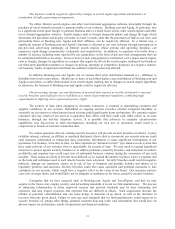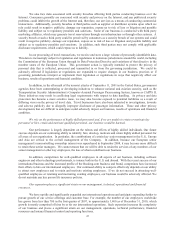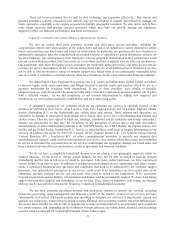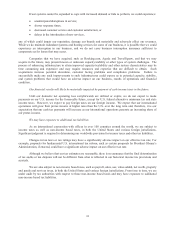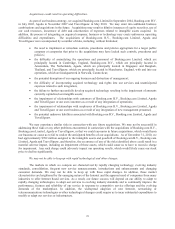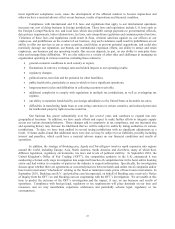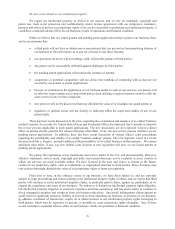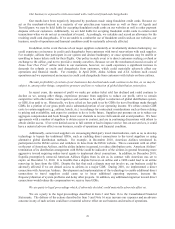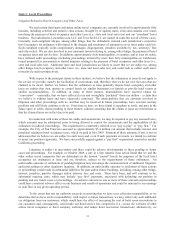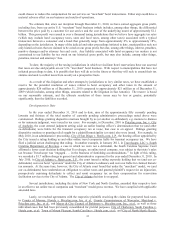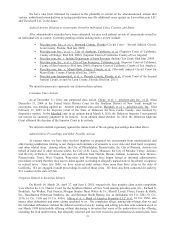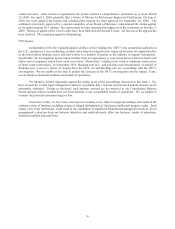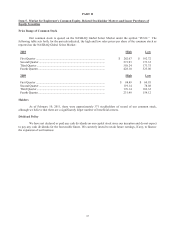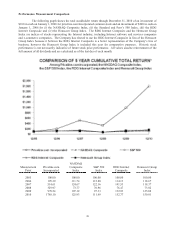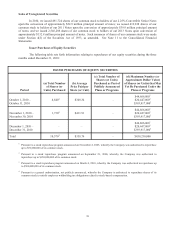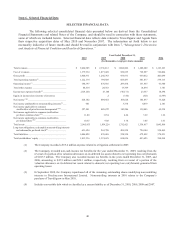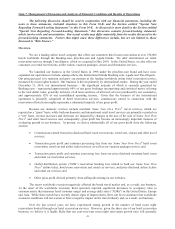Priceline 2010 Annual Report Download - page 105
Download and view the complete annual report
Please find page 105 of the 2010 Priceline annual report below. You can navigate through the pages in the report by either clicking on the pages listed below, or by using the keyword search tool below to find specific information within the annual report.
31
Item 3. Legal Proceedings
Litigation Related to Hotel Occupancy and Other Taxes
We and certain third-party defendant online travel companies are currently involved in approximately fifty
lawsuits, including certified and putative class actions, brought by or against states, cities and counties over issues
involving the payment of hotel occupancy and other taxes (i.e., state and local sales tax) and our “merchant” hotel
business. Our subsidiaries Lowestfare.com LLC and Travelweb LLC are named in some but not all of these cases.
Generally, each complaint alleges, among other things, that the defendants violated each jurisdiction’s respective
hotel occupancy tax ordinance with respect to the charges and remittance of amounts to cover taxes under each law.
Each complaint typically seeks compensatory damages, disgorgement, penalties available by law, attorneys’ fees
and other relief. We are also involved in one consumer lawsuit relating to, among other things, the payment of hotel
occupancy taxes and service fees. In addition, approximately sixty municipalities or counties, and at least six states,
have initiated audit proceedings (including proceedings initiated by more than forty municipalities in California),
issued proposed tax assessments or started inquiries relating to the payment of hotel occupancy and other taxes (i.e.,
state and local sales tax). Additional state and local jurisdictions are likely to assert that we are subject to, among
other things, hotel occupancy and other taxes (i.e., state and local sales tax) and could seek to collect such taxes,
retroactively and/or prospectively.
With respect to the principal claims in these matters, we believe that the ordinances at issue do not apply to
the service we provide, namely the facilitation of reservations, and, therefore, that we do not owe the taxes that are
claimed to be owed. Rather, we believe that the ordinances at issue generally impose hotel occupancy and other
taxes on entities that own, operate or control hotels (or similar businesses) or furnish or provide hotel rooms or
similar accommodations. In addition, in many of these matters, municipalities have asserted claims for
“conversion” – essentially, that we have collected a tax and wrongfully “pocketed” those tax dollars – a claim that
we believe is without basis and have vigorously contested. The municipalities that are currently involved in
litigation and other proceedings with us, and that may be involved in future proceedings, have asserted contrary
positions and will likely continue to do so. From time to time, we have found it expedient to settle, and may in the
future agree to settle, claims pending in these matters without conceding that the claims at issue are meritorious or
that the claimed taxes are in fact due to be paid.
In connection with some of these tax audits and assessments, we may be required to pay any assessed taxes,
which amounts may be substantial, prior to being allowed to contest the assessments and the applicability of the
ordinances in judicial proceedings. This requirement is commonly referred to as “pay to play” or “pay first.” For
example, the City of San Francisco assessed us approximately $3.4 million (an amount that includes interest and
penalties) relating to hotel occupancy taxes, which we paid in July 2009. Payment of these amounts, if any, is not an
admission that we believe we are subject to such taxes and, even if such payments are made, we intend to continue
to assert our position vigorously. We have successfully argued against a “pay first” requirement asserted in another
California proceeding.
Litigation is subject to uncertainty and there could be adverse developments in these pending or future
cases and proceedings. For example, in October 2009, a jury in a San Antonio class action found that we and the
other online travel companies that are defendants in the lawsuit “control” hotels for purposes of the local hotel
occupancy tax ordinances at issue and are, therefore, subject to the requirements of those ordinances. An
unfavorable outcome or settlement of pending litigation may encourage the commencement of additional litigation,
audit proceedings or other regulatory inquiries. In addition, an unfavorable outcome or settlement of these actions
or proceedings could result in substantial liabilities for past and/or future bookings, including, among other things,
interest, penalties, punitive damages and/or attorney fees and costs. There have been, and will continue to be,
substantial ongoing costs, which may include “pay first” payments, associated with defending our position in
pending and any future cases or proceedings. An adverse outcome in one or more of these unresolved proceedings
could have a material adverse effect on our business and results of operations and could be material to our earnings
or cash flow in any given operating period.
To the extent that any tax authority succeeds in asserting that we have a tax collection responsibility, or we
determine that we have such a responsibility, with respect to future transactions, we may collect any such additional
tax obligation from our customers, which would have the effect of increasing the cost of hotel room reservations to
our customers and, consequently, could make our hotel service less competitive (i.e., versus the websites of other
online travel companies or hotel company websites) and reduce hotel reservation transactions; alternatively, we


